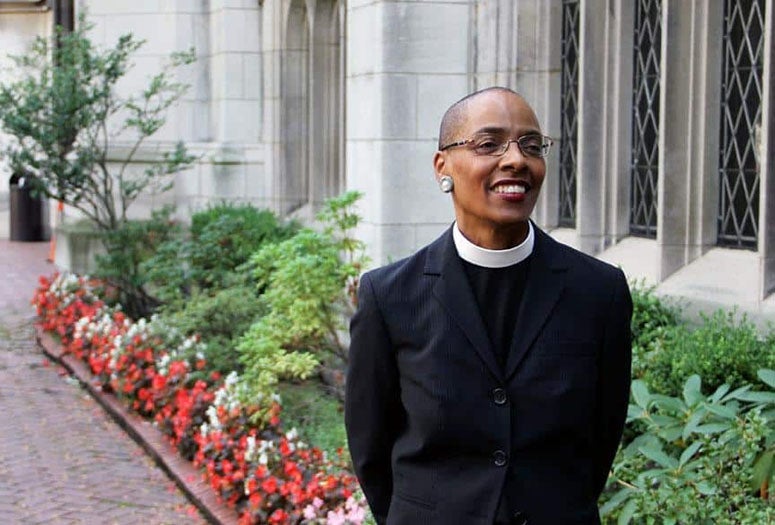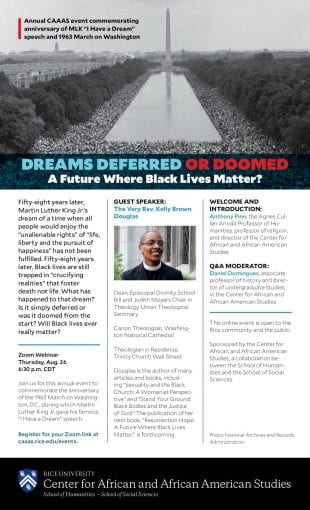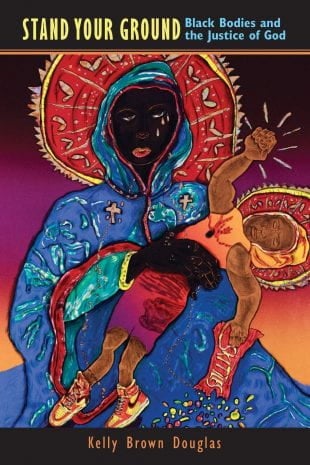“How do we really know that God cares when Black people are still getting killed? How long do we have to wait for the justice of God?”
That stunning question posed by her son inspired the Very Rev. Kelly Brown Douglas to write her latest book, “Resurrection Hope: A Future Where Black Lives Matter.” Her soul-searing line of inquiry will be explored during a lecture by Douglas Aug. 26 at 6:30 p.m.
“Dreams Deferred or Doomed — A Future Where Black Lives Matter?” is sponsored by Rice’s Center for African and African American Studies (CAAAS). The event will commemorate the 58th anniversary of the March on Washington for Jobs and Freedom, where Martin Luther King Jr. delivered his momentous “I Have a Dream” speech. The lecture delivered via Zoom is free and open to the public.
Nearly six decades after King’s 1963 speech from the steps of the Lincoln Memorial, such “unalienable rights” as “life, liberty and the pursuit of happiness” remain unfulfilled for many Black people in America. What happened to the dream? Is it simply deferred, or was it doomed from the start?
Douglas will deliver a message of resilience drawing on her experience as a priest — in 1983, she became one of the first 10 Black women to be ordained by the Episcopal Church USA — and her deep body of work as a pioneer in Black and womanist theology.
“She’s wrestled with some important issues, and so she raises interesting questions concerning our ability to hope in light of our circumstances and what kind of language and vocabulary is available to us to express that hope,” said Anthony Pinn, founding director of CAAAS, the Agnes Cullen Arnold Professor of Humanities and a professor of religion, who will introduce Douglas at her Aug. 26 lecture.
As dean of the Episcopal Divinity School at Union Theological Seminary and the Canon Theologian at the Washington National Cathedral, Douglas’s scholarly work on the Black church and the Black body is fundamental. The 25th anniversary edition of her first book, 1994’s “The Black Christ,” was released in 2019. Her groundbreaking 1998 follow-up, “Sexuality in the Black Church,” examined homophobia in the Black church from a womanist perspective.
“In terms of the academy, but also in terms of the church, she’s been a major voice,” Pinn said.
More recently, Douglas tackled the 2012 killing of Trayvon Martin in “Stand Your Ground: Black Bodies and the Justice of God.”
The book offered a religious and historical analysis of “stand your ground” laws as she sought to understand why unarmed Black children such as Martin can be perceived as threatening. Douglas also explored how to keep children safe in a society rife with racialized and institutionalized violence.
“It seems to me the opportunity to think that through, in light of more recent challenges to personhood and challenges to the kind of structural change Martin Luther King Jr. had in mind, could only be helpful,” Pinn said. “And what she's pushing for is a kind of mature hope — one that isn't blind to our circumstances but allows us to confront those circumstances, to recognize how messed up and screwed up our social world is, and then ask the question: ‘So now what?’”
A Q&A following Douglas’s lecture will be led by Daniel Domingues da Silva, associate professor of history and director of undergraduate studies for CAAAS. For more information or to register for the Zoom webinar, visit caaas.rice.edu/events.
“Dreams Deferred or Doomed — A Future Where Black Lives Matter?” by the Very Rev. Kelly Brown Douglas, Aug. 26, 6:30 p.m. CDT. Zoom. Free and open to the public. Sponsored by the Center for African and African American Studies, a collaboration between the School of Humanities and the School of Social Sciences.



